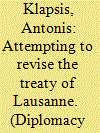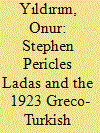| Srl | Item |
| 1 |
ID:
132412


|
|
|
|
|
| Publication |
2014.
|
| Summary/Abstract |
In June 1925, General Theodoros Pangalos imposed his dictatorship on Greece. During his 14-month rule, he set as one of his basic foreign policy goals the revision of the territorial settlement imposed on Greece and Turkey by the 1923 Treaty of Lausanne. Wanting to secure Eastern Thrace and possibly even part of Western Asia Minor for Greece, Pangalos sought the backing of at least one Great Power with interests in the region, in this case Italy, as its dictator, Benito Mussolini, remained equally hostile and aggressive toward Turkey. Pangalos tried to reach an understanding with Mussolini concerning the possibility of joint Greco-Italian action against Turkey. The first signs of closer co-operation came in early July 1925 when the Italian under-secretary of foreign affairs, Dino Grandi, visited Athens for discussions with Pangalos. However, a more important initiative involved the official visit of two Greek ministers-Loukas Kanakaris-Roufos, the foreign minister, and Anastasios Tavoularis, the transport minister-to Rome in early March 1926. They met with Mussolini who, because of British pressure, now seemed reluctant about Pangalos' ambitious plans for joint action against Turkey. The Greek leader's hopes to revise Lausanne ended.
|
|
|
|
|
|
|
|
|
|
|
|
|
|
|
|
| 2 |
ID:
186148


|
|
|
|
|
| Summary/Abstract |
This article focuses on the narrative of the 1923 Greco-Turkish Exchange of Populations with a focus on the role of a prominent figure in the making of this narrative, namely, Stephen Pericles Ladas. His 89-year-old book is still considered the standard text on the event and is unsurpassed in terms of its coverage of facts and figures. The article contextualizes and briefly examines this highly influential text on the Exchange of Minorities with a view to showing how it came to constitute the dominant narrative of the Greco-Turkish Exchange of Populations. It is argued that Ladas appropriated the findings and arguments about this event from the publications of his contemporaneous Greek intellectuals and then framed them within the parlance of international law to craft a narrative favorable to the nation-state and the League of Nations. In the absence of any challenging opinions and publications, this narrative, which was largely inattentive to the human and moral consequences of the event, became the standard account of the Greco-Turkish case to be widely quoted by the international political and scholarly circles preoccupied with the question of ethnic, religious and linguistic minorities during the interwar period and after.
|
|
|
|
|
|
|
|
|
|
|
|
|
|
|
|